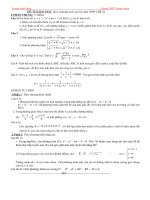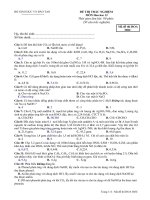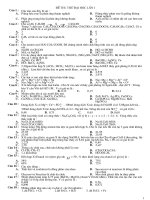ĐỀ THI THỬ TN-THPT CÓ ĐÁP ÁN - Đề 6 pot
Bạn đang xem bản rút gọn của tài liệu. Xem và tải ngay bản đầy đủ của tài liệu tại đây (59.79 KB, 4 trang )
ĐỀ THI THỬ TN-THPT CÓ ĐÁP ÁN - Đề 6
1-3. Pick out the word whose primary stress is different from the rest.
1. A. generation B. situation C. informality @D. majority
2. @A. apology B. vacancy C. applicant D. attitude
3. A. equal B. value C. pressure @D. belief
4-6. Choose the word whose underlined part is pronounced differently from that of
the others in each group.
4. A. leftovers @B. sacrifices C. halves D. days
5. A. supposed B. obliged C. determined @D.
wrapped
6. A. decide @B. consider C. provide D. confide
7-30. Choose the word, phrase or sentence that best completes each unfinished
sentence below or that best keeps the meaning of the original sentence if it is
substituted for the underlined word or phrase.
7. While students are ___________ the A-level course, they have to apply for a place at
university.
A. making @B. doing C. planning D. finishing
8. Indian students agreed that “a woman has to ___________ more in marriage than a
man”.
A. determine @B. sacrifice C. satisfy D. maintain
9. A: I’d like to invite you to dinner this Saturday - B: Thank you. ___________.
@A. I’d love to B. Oh, no. I can’t B. but I am busy D. I’d go
10. Don’t let the girl __________ until I come back.
@A. go B. to go C. going D. gone
11. Are you allowed __________ the motorbike?
A. use @B. to use C. using D. used
12. Mathematics is a __________ subject in American high schools.
A. difficult B. easy @C. compulsory D. different
13. I’ve been invited_______ a wedding _______14
th
February.
A. for/at @B. to/on C. at/in D. on/to
14. The men injured in the accident _______ to hospital.
A. took B. was taken C. taking @D. were
taken
15. I got to class on time _______I had missed the bus.
A. because @B. even though C. despite D. but
16. He will never advance in his job _______he improves his language skills.
A. otherwise B. if C. only if @D. unless
17. He asked me ________a bicycle.
A. that if you had B. do you have C. that I had @D. if I
had
18. Only coffee and dessert _______at the reception yesterday.
A. had served B. was served @C. were served D. were
serving
19. Probably the most _______ way of attracting someone’s attention is by waving.
A. unusual @B. common C. appropriate D. best
20. To attract someone’s attention, we can use either verbal or non verbal forms of
_______.
A. assistance B. situation @C. communication D.
compliment
21. She said, “ We went swimming today”.
A. She said they went swimming that day. @B. She said they had gone swimming
that day.
C. She told they had gone swimming that day. D. B and C are correct.
22. Our house is older than all the other houses in this road.
A. No house in this road is older than our. B. No house in this road is as older as
our house.
@C. No house in this road is older than ours. D. No house in this road isn’t older than
ours.
23. He last had his eyes tested ten months ago.
A. He had tested his eyes ten months before. B. He had not tested his eyes for ten
months then.
@C. He hasn’t had his eyes tested for ten months. D. He didn’t have any test on
his eyes in ten months.
24. I did this exercise in two hours.
A. I spent two hours to do this exercise. B. I began to do this exercise at two
o’clock.
C. It took me two hours doing this exercise. @D. It took me two hours to do this
exercise.
25.______ the gold medal, he will have to do better than that.
A. To win B. So he win C. So that he wins @D.
Winning
26. A: ______? -B: Once a week.
@A. How often B. How much do you want C. When
will you get there D. Are you sure
27. That’s me. I’m looking awfully fat, ______?
A. am I B. am I not @C. aren’t I D. aren’t
you
28. He ______ten eggs a day.
A. believes to eat B. believes to be eaten C. is believed to be eaten @D. is
believed to eat
29. If she __________ more polite, she __________ less trouble.
A. had been/ would have B. was/ would have met
C. were/ hadn’t had @D. were/ would have
30. A: Would you like tea or coffee? – B: I’d ___________ to drink tea rather than
coffee.
A. hate @B. prefer C. rather D. wish
31-40. Read the following passage and choose the word that best fits each space.
Around the age of sixteen, you must make one of the biggest decisions of your life.
Do I stay on at school and hopefully go on to university (31) __________? Do I leave
and start work or beginning a training (32) ___________?
The decision is yours, but it may be (33) __________ remembering two things: there
is more unemployment (34) ____________ who haven’t been to university, and people
who have the right (35) _________ will have a big advantage in the competition for jobs.
If you decide to go (36) __________ into a job, there are many opportunities for training.
Getting qualifications will (37) ___________ you to get on more quickly in many
careers, and evening classes allow you to learn (38) ___________ you earn. Starting
work and taking a break to study when you are older is (39) ___________ possibility.
This way, you can save up money for your student days, as well as (40) __________
practical work experience.
31. A. after @B. later C. then D. past
32. A. school B. class @C. course D. term
33. @A. worth B. necessary C. important D. useful
34. A. between @B. among C. with D. through
35. A. notes B. papers C. arts @D. skills
36. @A. straight B. just C. direct D. rather
37. A. make @B. help C. let D. give
38. A. where @B. while C. when D. what
39. A. also B. again @C. another D. always
40. @A. getting B. making C. taking D. doing
41-45. Read the passage below and choose one best answer (A), (B), (C) or (D) to
each question.
In many modern countries, people think of a family as a mother, a father and their
children. But this is not the kind only of the family group. In some parts of the world, a
family group has many other members. This kind of large family is called an “extended
family” or a “joint family”.
The joint family includes all living relatives on either the mother’s or the father’s side
of the family. It is made up of grandparents, parents, brothers, sisters, uncles, aunts and
cousins. They live together in a large house or in huts built close together.
Early people probably lived in joint families. They had to be part of a large group in
order to survive. The members of the group help each other hunt. They work together to
protect themselves from dangerous animals and other enemies. In China, people lived in
joint families. When a son married, he and his wife lived at his parents’ home. Unmarried
daughters remained at home until they married. Chinese children felt very loyal to their
parents. Younger members of the joint family always took care of the old ones.
In India and Africa, some people still live in joint families. The members of a joint
family share their earnings and property. If one members of the group becomes ill or has
bad luck, the others help the person. As in the past, the members of the joint family offer
each other help and protection.
41. The word in paragraph 2 that means “to be made up of” is _____________.
@A. include B. relatives C. live D. hut
42. Long time ago, members of joint families _____________.
A. did not live together @B. helped each other catch animals
C. only played together D. lived separately in order to survive
43. Chinese people felt loyal to their _____________.
A. relatives @B. parents C. cousins D. younger
members
44. In India and Africa, people in joint families help a person when ____________.
A. he has good luck @B. he has bad luck C. he gets rid of illness D. he shares
them his earnings
45. On the whole, this story is about ____________.
A. all types of family B. families in China
@C. joint families D. families found in India and Africa
46-50. Identify the underlined word or phrase that must be changed in order to
make the sentence correct.
46. The salad tasted so well @ (A)that my brother returned to (B)the salad bar for (C)
another helping (D)
47. By (A) law, every (B) man, woman and child are quaranteed @ (C) the right to (D)
free speech
49. I like to have (A) my teeth (B) check @ (C) every (D) few months.
46. The (A) receptionist told (B) me about waiting @ (C) here until I’m called (D).
50. My main responsible @ (A) is (B) to wash (C) the dishes and take out (D) the
garbage.









